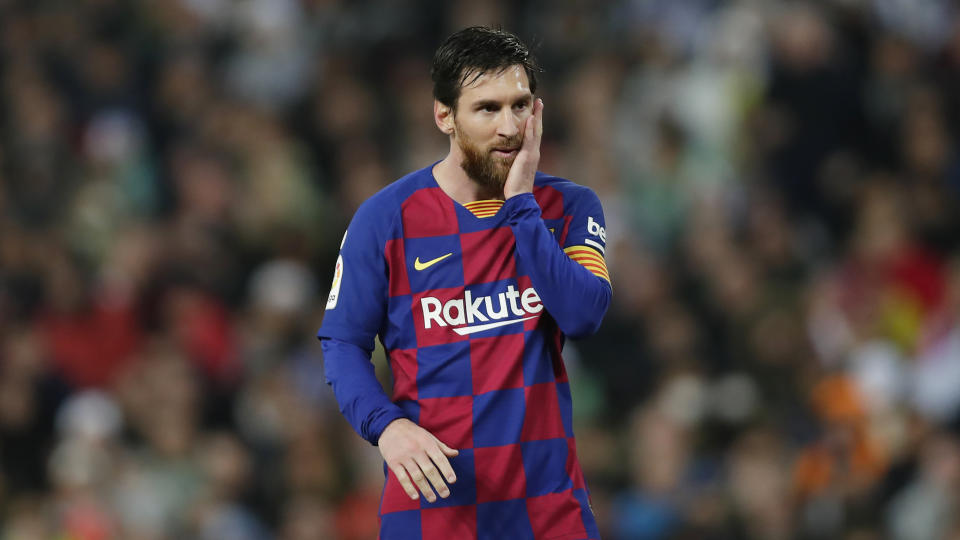How Lionel Messi's greatness is holding Barcelona's needed rebuild hostage
With Lionel Messi, Barcelona has soared. The greatest player of all time fashioned around him the greatest team of all time. Or certainly the most admired one, at any rate. In 15 seasons and change with the first team, after rising from the academy, Messi produced 633 competitive goals, 10 La Liga titles, four Champions League titles, six Copa del Reys, three Club World Cups and six sweeps of the world player of the year awards.
Yadda, yadda, yadda. You know the deal.
But this season, Barcelona will likely win nothing at all. They’re still in the Champions League, but winning it feels like a long shot. Barca’s form hasn’t exactly been scintillating. The 5-0 thumping of Alaves on the final day of the league season shouldn’t obscure the way the Catalans stumbled to the finish line and surrendered their perch atop La Liga to Real Madrid without much of a fight.
The team is plainly in need of a refresh, or perhaps even a wholesale rebuild. And here is where Messi, for the first time in his career, might stand in the way of Barca’s long-term prosperity.
Messi has just turned 33, but in spite of a workload that is slowly creeping toward 1,000 competitive games — he currently stands at 761 games with Barca and its reserve teams and 161 with Argentina from its under-20s through the senior national team — he remains the most dominant player around. The games where he simply gets fed up and takes control feel a bit less common now, but he remains entirely capable of deciding the outcome with just a few touches of the ball.

All around him, other men are losing their own fight with time. Defensive bedrock Gerard Pique is also 33. Sergio Busquets, the great negator and connector in front of the defense, is 32. Striker Luis Suarez is 33 as well and not the jitterbug he once was. Try as they might, their aging is not as graceful as Messi’s. And Neymar is long gone, sold three summers ago, robbing Messi of the lightning rod that made his life so much easier.
Jordi Alba, Ivan Rakitic and Arturo Vidal are all in their 30s as well. Antoine Griezmann will be next March. And most of the younger players, expensively signed as a succession plan, have either not cohered with Messi or not panned out at all.
This season has been disastrous — unless it is redeemed by a European crown, but that, again, seems far-fetched. A manager was fired in the middle of the campaign for the first time since Messi was a youth player, and his successor is now on the hot seat, too. Just about any other club would have undertaken a wholesale clear-out of the first team and gotten to work on a reset.
But this is Messi’s team.
There is some disagreement over how much power Messi really wields at the club. To hear some tell it, he is its de facto president, signing off on any managerial hire or major signing. Others, including Messi’s own camp, argue that he’s a player like any other with no particular influence beyond what he does on the field. But whatever the case, there is no disputing that Barca has, for many years, gone far out of its way to keep its captain happy. Endless salary raises are the obvious example. But a never-ending investment in arrived superstars for the first team is intended to reinforce as much as to sate the superstar.
Messi wants to win the Champions League again. He wants to keep winning. He wants Barca to be competitive every year. He won’t suffer a season to work in young players. Yet in Ansu Fati and Riqui Puig, some fantastically talented academy products are breaking through.
This is the central conflict in Barcelona’s squad construction. The club has to somehow keep an aging core, familiar and close to Messi, intact to stay competitive now, while planning for tomorrow and an inevitable post-Messi team without suffering any drop-off. Or else Messi might be tempted to leave, as he has contemplated once or twice before, and that would be an intolerable outcome. He is Messi. How many times has the Camp Nou faithful literally bowed down to him?
There is no easy answer here. So long as you have Messi, so long as he remains in his full pomp, you cannot entertain the thought of wasting a year. Or, worse, allowing him to slip away. The fans would never forgive the perpetrators of such a self-inflicted wound. And, besides, Messi has earned the right to be competitive until he is good and ready to retire.
But then the club is also, in some ways, shackled to his legacy. It owes its modern greatness to him. Messi won’t suffer a lost season. And so it remains stuck, trying to craft another transcendent team from a bunch of players who are very old, some who are very young, and the ones in between, who are mostly not quite good enough.
Leander Schaerlaeckens is a Yahoo Sports soccer columnist and a sports communication lecturer at Marist College. Follow him on Twitter @LeanderAlphabet.
More from Yahoo Sports:

